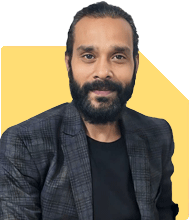50-Year-Old Looking for Health Insurance and Investment Advice for Retirement and Child's Education
Milind Vadjikar |591 Answers |Ask -Follow
Insurance, Stocks, MF, PF Expert - Answered on Sep 11, 2024
He has a mechanical engineering degree from Government Engineering College, Sambhajinagar, and an MBA in international business from the Symbiosis Institute of Business Management, Pune.
With over 16 years of experience in stock investments, and over six year experience in investment guidance and support, he believes that balanced asset allocation and goal-focused disciplined investing is the key to achieving investor goals.... more

Which is best and reliable health insurance in India. Sateting investment now and considering to retire after 10 yrs ..what is best plan and how much one should invest ..considering inflation...at that time ..to have descent lifestyle.. And which investment is good for child education..for ..graduation after 6 yr ..
1. Niva Bupa
2. Care Health
Do your due diligence and seek help of an insurance advisor, if needed.
For retirement planning you can consider investing in Retirement mutual funds(equity oriented)via SIP for 10 years. ICICI Pru Retirement fund(equity plan) and HDFC Retirement Savings fund (equity plan) are top two based on 5 yr return yardstick.
For funding child's higher education you can consider Children mutual funds via regular SIP. Top in this category are Tata Young Citizens Fund and UTI Children's equity fund based on 5 yr return yardstick.
Both these funds come with a lock-in of 5 years
*Investments in mutual funds are subject to market risks. Please read all scheme related documents carefully before investing
You may follow us on X at @mars_invest for updates
You may like to see similar questions and answers below
Ramalingam Kalirajan |6986 Answers |Ask -Follow
Mutual Funds, Financial Planning Expert - Answered on Apr 30, 2024
Milind Vadjikar |591 Answers |Ask -Follow
Insurance, Stocks, MF, PF Expert - Answered on Oct 15, 2024
Milind Vadjikar |591 Answers |Ask -Follow
Insurance, Stocks, MF, PF Expert - Answered on Oct 15, 2024
Milind Vadjikar |591 Answers |Ask -Follow
Insurance, Stocks, MF, PF Expert - Answered on Nov 04, 2024
Milind Vadjikar |591 Answers |Ask -Follow
Insurance, Stocks, MF, PF Expert - Answered on Nov 07, 2024
Anu Krishna |1281 Answers |Ask -Follow
Relationships Expert, Mind Coach - Answered on Nov 07, 2024
Anu Krishna |1281 Answers |Ask -Follow
Relationships Expert, Mind Coach - Answered on Nov 07, 2024
Anu Krishna |1281 Answers |Ask -Follow
Relationships Expert, Mind Coach - Answered on Nov 07, 2024
Anu Krishna |1281 Answers |Ask -Follow
Relationships Expert, Mind Coach - Answered on Nov 07, 2024
Anu Krishna |1281 Answers |Ask -Follow
Relationships Expert, Mind Coach - Answered on Nov 07, 2024
Dr Pananjay K Tiwari |95 Answers |Ask -Follow
Study Abroad Expert - Answered on Nov 07, 2024
Dr Pananjay K Tiwari |95 Answers |Ask -Follow
Study Abroad Expert - Answered on Nov 07, 2024
Dr Pananjay K Tiwari |95 Answers |Ask -Follow
Study Abroad Expert - Answered on Nov 07, 2024
Dr Pananjay K Tiwari |95 Answers |Ask -Follow
Study Abroad Expert - Answered on Nov 07, 2024
























